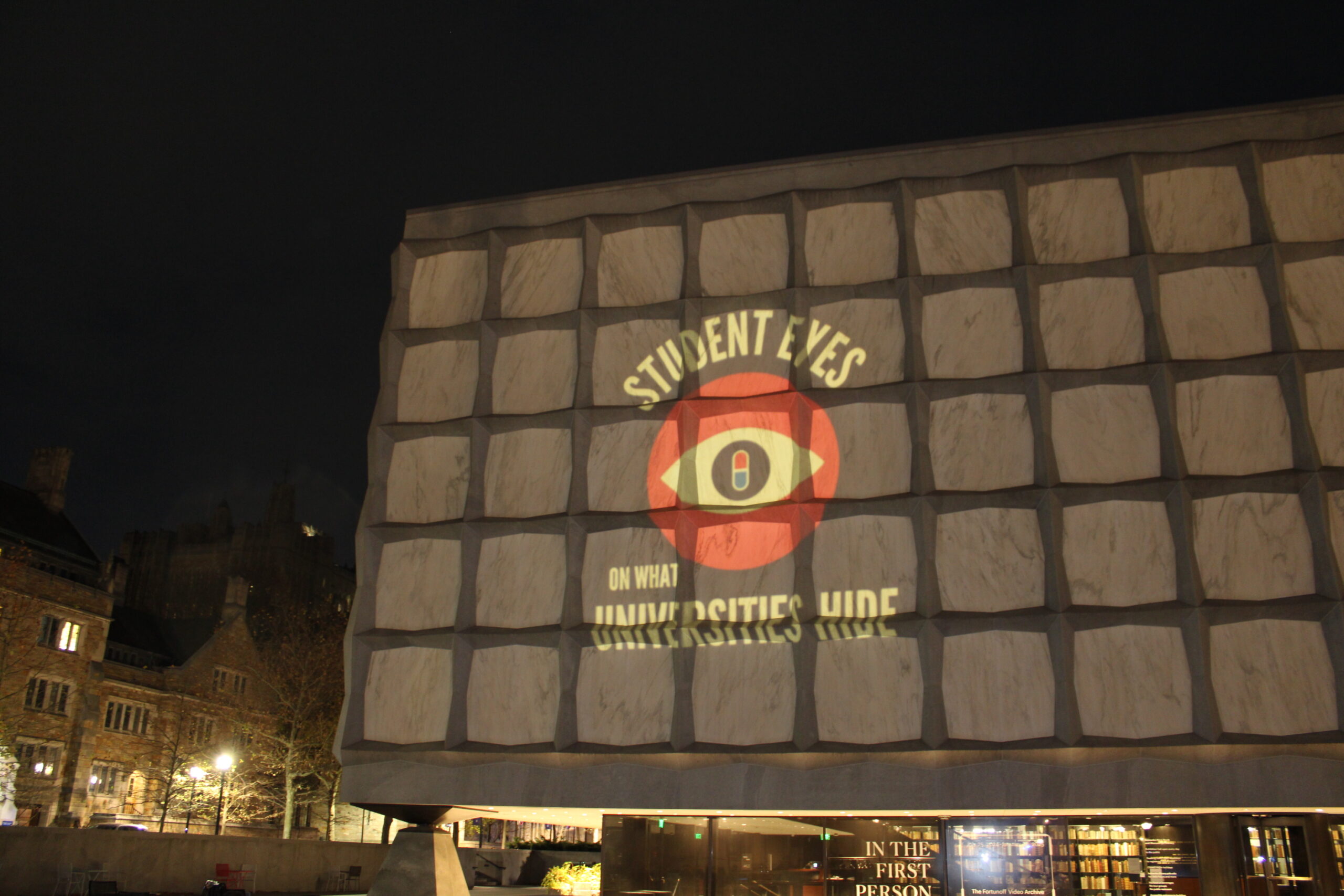Call for University-driven drug pricing reform projected onto beinecke library, violating policy
Last Thursday, Yale’s chapter of Universities Allied for Essential Medicines projected an image onto Beinecke Library, violating University policy to call for action.

Asuka Koda, Contributing Photographer
At 6 p.m. last Thursday, a glowing image of an eye with a pill for an iris illuminated Yale’s Beinecke Rare Book and Manuscript Library. The projection, organized by Yale’s chapter of Universities Allied for Essential Medicines — UAEM — aimed to spotlight the University’s role in making drugs developed with public funds affordable and accessible to all.
The projection marked UAEM’s participation in Access to Medicines Week, a global series of events designed to address inequities in healthcare access. For UAEM’s leadership, the campaign represents a broader mission: holding universities accountable for using their research outputs for the public good.
“[The public] ends up paying twice: once through taxes and again through inflated drug prices,” Simona Hausleitner ’25, founder and president of UAEM’s Yale chapter, told the News. “We want to hold universities more accountable, ensure for more clinical trial transparency and ensure that patenting law is more fair and doesn’t only prioritize profits over people.”
The eye projection onto Beinecke Library was a symbolic critique of Yale’s patenting and licensing practices, which UAEM claims prioritize corporate profit over public access. Many drugs developed at the University rely heavily on government funding, for example from the National Institutes of Health, which UAEM argues should obligate the University to ensure affordability.
Hausleitner described the projection as a visual call to action, “almost like a Batman logo projected into the night sky.”
Projections in Beinecke Plaza, like the one UAEM projected on Thursday, are prohibited according to University policy.
“I think in this case, just as with many protests, it is better to ask for forgiveness than for permission,” Hausleitner told the News. “We did not request permission, but I think that’s for the best. Actually, I think it would be less of a powerful, impactful statement if we did. When have protests ever asked for permission?”
Sahil Mane ’24 is a part of the North America Coordinating Committee for UAEM and co-founded Yale’s UAEM chapter with Hausleitner. Mane designed the logo and set up the projection.
Mane says that he believes the projection was not meant to be a protest. According to him, the projection was up for 16 minutes and 45 seconds. A Yale Security officer asked the group to take the projection down, to which the group complied.
“This is not supposed to be adversarial to the Yale Ventures office, but more so just a reminder that we still care about how the University licenses its medications, and we’re hoping we kind of use this week to build a little bit of buzz,” Mane said. “We’re hoping to ask the tech transfer office [at Yale Ventures] to maybe make a statement, some sort of public report on how they’ve lived up to their promises to equitably license their medications for the document signed in 2009.”
Mane referred to the Statement of Principles and Strategies for the Equitable Dissemination of Medical Technologies developed and endorsed by several universities and the Association of University Technology Managers. Yale was one of six universities that signed the document in 2009.
The document outlines commitments to promote equitable access to health-related technologies, particularly in developing countries. These commitments include creating innovative licensing strategies that prioritize global health needs, avoiding patent barriers that could hinder access and providing financial incentives for licensees to ensure affordability.
To measure progress, the institutions pledge to develop meaningful metrics for evaluating their efforts and to share best practices, ensuring that these principles remain a “living document” that evolves with emerging challenges and opportunities.
According to Mane, UAEM is calling for the Yale Ventures office to make a public statement on a progress update on strategies to commit to the promises the University made in 2009.
In a Tuesday statement to the News, Yale Ventures wrote that the office continues to be “guided by” the Statement of Principles and Strategies for the Equitable Dissemination of Medical Technologies. Yale Ventures added that the office has provided progress reports, like the Yale Ventures Annual Report, and implemented licensing strategies that meet UAEM’s demands for equitable access to medical technologies.
The team also said that Yale has been committing a percentage of sales to low-income and lower-middle-income countries since the early 2000s.
According to Yale Ventures, Yale has been offering products at substantially reduced prices “to ensure that innovations developed with its support are accessible to underserved populations worldwide and restricts licensees’ ability to file patents or require Yale to file patents in low-income and lower-middle-income countries.”
There are 51 UAEM chapters worldwide, according to Mane.







